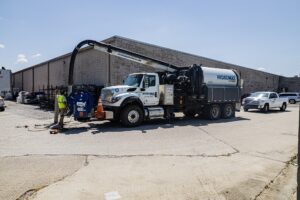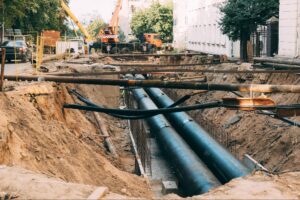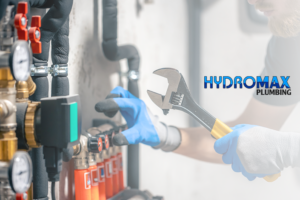Regular plumbing maintenance is more than just another item on a facility manager’s to-do list—it is essential for keeping a commercial building’s operations running smoothly. In high-traffic environments like office complexes, restaurants, and industrial facilities, plumbing systems must handle substantial usage, ensuring restrooms, kitchens, and other water-dependent areas are consistently available to employees and customers. Once a plumbing problem arises—whether it’s a clogged drain, overflowing grease trap, or major pipe failure—businesses can face revenue loss, reputational harm, and even pricey emergency fixes.
This article explores the unique demands of commercial plumbing systems, outlines common trouble spots, and highlights how proactive, regular maintenance can protect both your property and bottom line.
Understanding the Unique Demands of Commercial Plumbing Systems
A commercial building’s plumbing requirements go well beyond those of a single-family home. The constant flow of people, specialized equipment, and high usage volumes create distinct stressors that call for vigilant oversight:
- High Usage Volume: From morning to night, dozens—or even hundreds—of individuals may use the restrooms, kitchens, and other water-based resources in a commercial space. This greater demand accelerates wear and tear on pipes, fixtures, and drainage systems.
- Specialized Fixtures and Systems: Many commercial buildings, such as restaurants or manufacturing facilities, use specialized equipment that requires particular plumbing configurations to transport water, gas, or other materials. For instance, restaurants commonly install and maintain grease traps to handle fats and oils, while industrial facilities may have dedicated lines for various processes. In industrial environments, following OSHA standards is also critical to ensure the safety of workers and compliance with regulations.
- Compliance with Codes and Regulations: Commercial plumbing systems must meet strict codes imposed by local health departments, regulatory agencies, and insurance providers. For instance, Indiana’s Plumbing Code provides guidelines that commercial properties must follow to maintain safety and sanitation.
- Larger-Scale Infrastructure: With expansive square footage, multiple restroom facilities, and often complex landscapes, addressing potential issues (like underground sewer lines or drainage malfunctions) demands experience and proactive monitoring.
Recognizing these sizable demands is the first step to preventing plumbing failures. The next step is implementing a regular maintenance schedule, carried out by professionals who understand commercial systems inside and out.
Common Plumbing Issues in Commercial Buildings and Their Causes

Even the most robust commercial system can run into trouble if maintenance lapses. Below are some frequent concerns property managers encounter:
- Drain and Toilet Clogs: High-traffic restrooms are notorious for clogs from paper towels, sanitary products, and other debris. Kitchens, meanwhile, can experience buildup from food waste and oils. Without timely drain cleaning and pipe inspections, these clogs can cause backups and property damage.
- Malfunctioning Grease Traps: Restaurants, cafeterias, and food manufacturers rely heavily on grease traps to prevent solid fats from entering the drainage system. The EPA notes that proper grease trap management is vital to prevent blockages, foul odors, and environmental pollutants. Proper disposal of wastewater from commercial kitchens must also follow guidelines from the Indiana Department of Environmental Management (IDEM), ensuring environmental protection and regulatory compliance.
- Leaky or Corroded Pipes: Over time, pipes can deteriorate due to pressure fluctuations, aging materials, or corrosion. According to the American Water Works Association, older pipe networks often degrade, leading to leaks and potential structural damage.
- Sewer Line Blockages: Tree roots and shifts in the ground can disrupt underground sewer lines, especially in landscaped commercial areas. If not detected early, these blockages can result in unpleasant odors, slow drains, or extensive cleanup costs.
- Inadequate Stormwater Management: Large parking lots, outdoor seating areas, and commercial rooftops need effective stormwater systems to prevent flooding. Leaves, debris, and routine wear can impede these systems, leading to standing water hazards and costly structural damage.
Risks and Costs of Neglecting Regular Plumbing Maintenance
Even minor plumbing issues can escalate quickly in a commercial setting. When something goes wrong, the ripple effects can disrupt operations, harm your organization’s reputation, and hit revenue hard. Some of the biggest risks of failing to schedule regular plumbing maintenance include:
- Unexpected Shutdowns: A single burst pipe can force you to close off entire sections of your building. If the problem is severe, you may need to shut down operations entirely until the plumbing issue is resolved.
- Mounting Repair Expenses: Small leaks that go unnoticed can cause hidden water damage over time. Eventually, you could face more extensive—and more expensive—repairs or renovations.
- Non-compliance Penalties: Regulatory bodies require strict adherence to building and health codes, especially for food service or public-facing environments. Simple oversights in plumbing can escalate into violations, resulting in fines and mandatory corrections.
- Safety and Liability Concerns: Flooded floors and faulty drains raise slip-and-fall risks, while sewage backups or mold growth threaten occupant health. The CDC provides guidelines for addressing potential health hazards from flooding, highlighting the importance of quick and thorough repairs.
The Benefits of Proactive Plumbing Maintenance for Commercial Buildings
Routine maintenance programs are an investment that yields long-term rewards. By prioritizing proactive care, business owners and facility managers can expect:
- Fewer Emergency Calls: Identifying and resolving developing problems prevents urgent, after-hours repair bills.
- Extended Equipment Lifespans: Proper upkeep of pipes, fixtures, and drainage lines delays costly system overhauls.
- Improved Operational Efficiency: Fully functioning restrooms, kitchens, and production facilities keep employees happy and maintain productivity.
- Enhanced Health and Safety: Well-kept systems reduce potential hazards, ensuring occupants can trust the water they use and the drains they rely on. The American Society of Plumbing Engineers (ASPE) emphasizes that consistent schedules for inspections and upgrades can significantly reduce the likelihood of unexpected plumbing crises.
The Role of Regular Inspections in Preventative Plumbing Maintenance

Regular, thorough inspections are one of the keystones of preventing large-scale plumbing emergencies. By scheduling these assessments at key intervals throughout the year, you can discover hidden vulnerabilities and address problems before they escalate.
- Video Camera Inspections: Non-invasive cameras travel through pipes to identify buildup, clogs, or structural damage. This process quickly highlights problem areas that often remain invisible until a major blockage occurs.
- Smoke Testing: By releasing smoke into the sewer lines, our technicians can pinpoint cracks or leaks that allow odors or pollutants to seep out. This precise method reduces guesswork and helps prioritize the most urgent repairs.
- Pressure Testing: Evaluating plumbing systems under various pressures reveals weak points in pipe segments, valves, or fittings, preventing bursts and leaks before they happen.
When combined with routine record-keeping, these assessments form a blueprint for understanding your system’s condition over time. Data gathered during each inspection can inform future budgeting for replacements or upgrades, making facility maintenance more predictable and cost-effective.
How to Create an Effective Plumbing Maintenance Schedule


Crafting a structured plan that keeps your plumbing system well-maintained requires forethought and collaboration. Here are practical steps for success:
- Conduct a Baseline Assessment: Begin by examining your building’s existing plumbing setup. Identify areas that need immediate attention—whether due to age, excessive usage, or past issues.
- Categorize Systems by Priority: Allocate resources more effectively by ranking systems or components based on risk. High-traffic restrooms or older pipes may demand more frequent checks than newer installations.
- Develop Inspection and Service Timelines: Coordinate scheduled inspections, such as video camera checks or grease trap cleaning, around your operational calendar. Align maintenance tasks with quieter business periods to minimize disruptions.
- Train Staff to Spot Early Signs: Empower on-site personnel—like facility managers, security staff, or shift supervisors—to recognize early warning signals: slow drains, unusual odors, or small wet spots on walls. The sooner these symptoms are reported, the quicker they can be addressed.
- Partner with a Reliable Plumbing Service: Establishing an ongoing relationship with a trusted contractor—like Hydromax Plumbing—provides continuity and expert guidance, ensuring your schedule remains current with industry best practices and evolving building codes.
By committing to a formal maintenance plan, the chances of sudden breakdowns plummet and your property continues to operate safely and efficiently.
Your Partner in Commercial Plumbing: Why Choose Hydromax Plumbing
Commercial plumbing is multifaceted, often blending multiple systems—such as water lines, drainage, gas piping, process piping, and stormwater management—under one roof. Hydromax Plumbing’s extensive hands-on experience makes us well-equipped to handle these complexities. We don’t just fix problems; we serve as a strategic partner dedicated to protecting your facility.
Here’s what sets us apart:
- Comprehensive Commercial Services: We specialize in solutions tailored to the unique demands of commercial properties, including routine grease trap maintenance, complex process piping installation, stormwater management, and more.
- Advanced Diagnostics & Repair: We minimize guesswork and disruption by using modern technology. Our team is proficient in camera inspections, smoke and pressure testing for precise leak detection, and innovative trenchless repair methods that preserve your property and landscaping.
- Proven Local Expertise: As a locally owned and operated business in Evansville, we understand the region’s building codes, climate-related challenges, and unique business needs. Our plumbers are licensed, bonded, and insured, guaranteeing a consistent standard of high-quality craftsmanship.
- 24/7 Emergency Availability: We recognize that commercial plumbing issues can surface at any hour. Our team is ready to respond instantly, day or night, to minimize damage and costly downtime for your operations.
- A Commitment to Partnership: We care about our clients’ long-term success. By focusing on both immediate fixes and forward-looking prevention, we work collaboratively to develop tailored maintenance plans that extend the life of your plumbing network and reduce your overall maintenance budget.
When you entrust us with your commercial plumbing needs, you not only get thorough service and prompt responses—you also gain a partner dedicated to ensuring your property’s plumbing system operates reliably and efficiently.
Embrace Proactive Maintenance for Sustainable Commercial Plumbing Success
Commercial plumbing systems function as vital lifelines for businesses, managing everything from restroom facilities to kitchen operations and stormwater drainage. Without proper maintenance, seemingly minor issues can rapidly escalate, causing unplanned downtime, safety hazards, and significant repair costs. In contrast, a proactive regimen of regular plumbing maintenance helps your business avoid unexpected incidents, protects public health, and maintains compliance with building codes.
Contact Hydromax Plumbing to schedule your preventative maintenance and learn how we can support your commercial operations. Protect your premises, your people, and your bottom line with a robust commercial plumbing maintenance strategy today.




